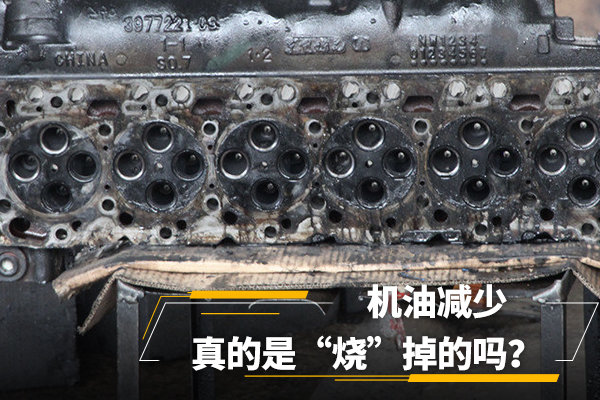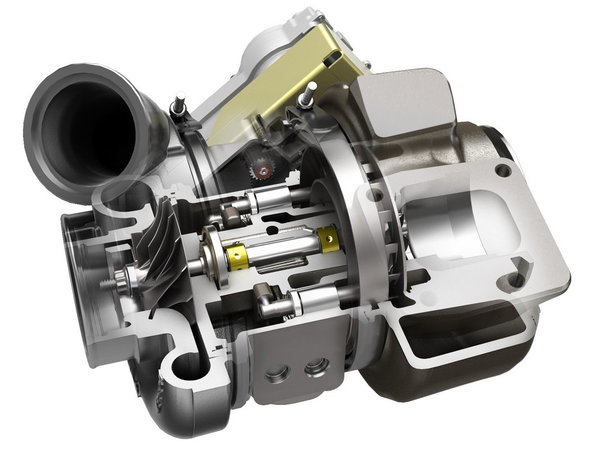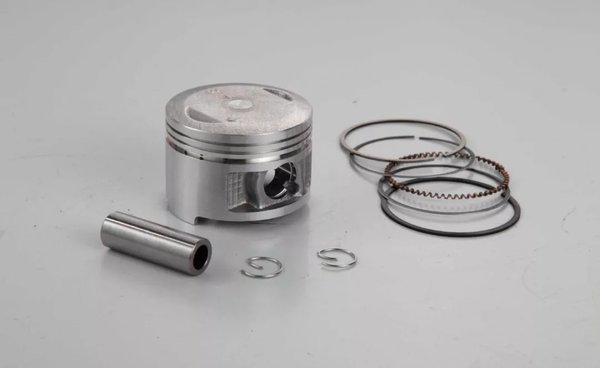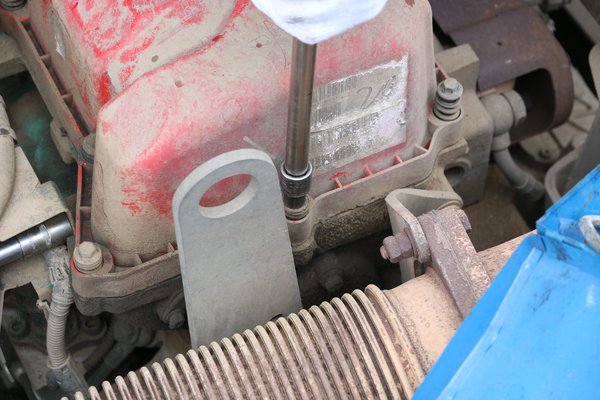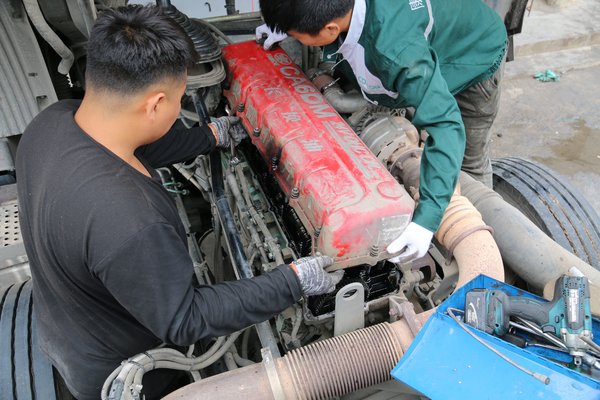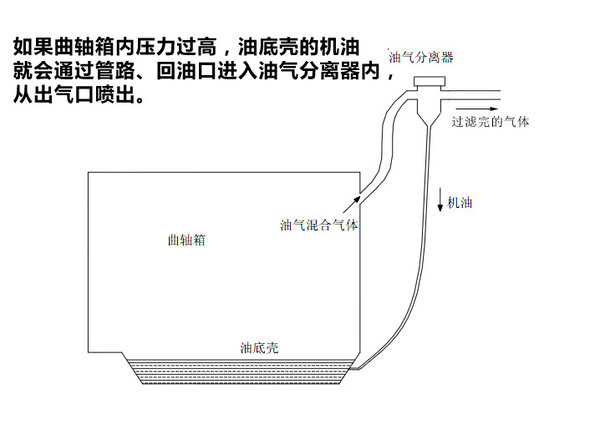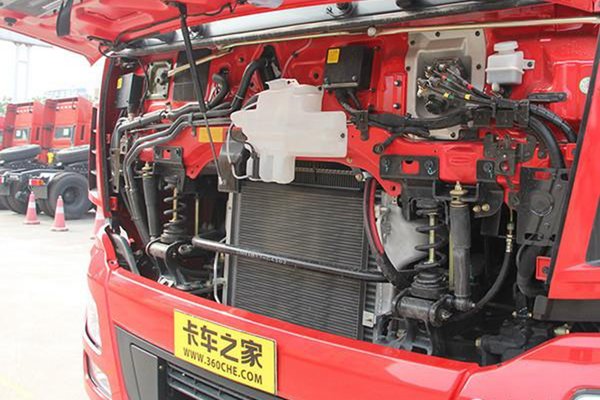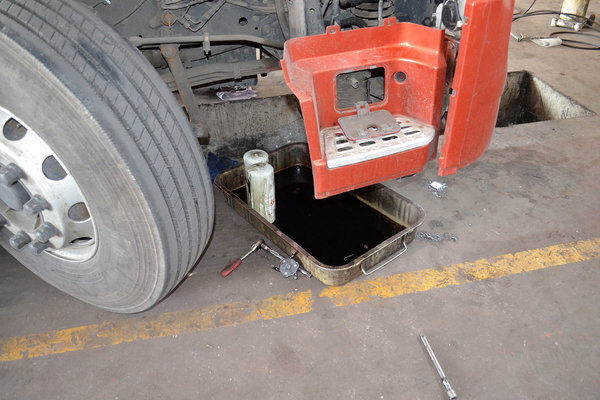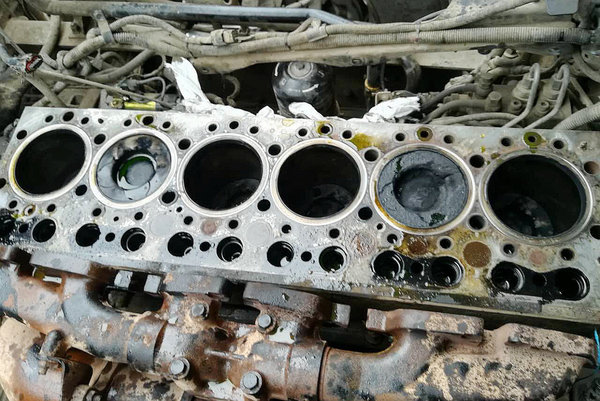21
2025
-
07
Truck Encyclopedia (12): Is the oil reduction really burning?
When the truck burns oil, many cardholders will be very big, which often means that the vehicle needs a major overhaul. Why is motor oil consumed? Where is oil consumed from? In this issue, the card family encyclopedia will talk about the consumption of engine oil.
▎Why is engine oil consumed?
"
Let's throw out the conclusion first: whether it is a naturally aspirated engine or a turbocharged engine, as long as the engine is running, it will definitely consume oil.
"
However, the oil of the engine is divided into normal and abnormal consumption.
Let's talk about normal consumption first.
The role of engine oil is to lubricate the internal moving parts of the engine, due to the structure and working principle of the engine, there will inevitably be a part of the oil through the valve, piston ring and cylinder wall gap and crankcase ventilation system into the cylinder into the cylinder combustion consumption, which is normal engine oil consumption.
At present, our country has not issued a national mandatory standard for the oil consumption of the car in use, but we have 2 oil consumption standards that can be referenced.
One is the 1984 "National Automobile Engine Test Standard GB3743-84", which stipulates that the oil consumption should be less than 1 liter/1000 kilometers.
The other is the 2003 automobile engine reliability test method (GB/T19055-2003).
This standard stipulates that the oil/fuel consumption ratio shall not exceed 0.3% at full load at the rated speed. However, this is only a test method, and it is not mandatory by the state.
In addition, we have a way to evaluate whether your oil consumption is normal, that is, your oil level height is not lower than the lower limit of the dipstick during each service cycle. If you fall below the lower dipstick limit during the service interval, your vehicle may be experiencing abnormal oil consumption.
After reading the normal consumption of engine oil, I believe that some cardholders can guess where the abnormal oil consumption is lost.
During normal engine operation, oil is consumed from valves, pistons, crankshaft vents. If there is a problem in these areas, then the consumption of engine oil is very likely to increase, how is the specific oil consumed? Read on.
▎ Oil consumption, where is the "burning"?
The first and most common cause is the aging of the internal parts of the engine that causes oil leakage, which mostly occurs in old cars. The most likely leaks are as follows:
1. Turbocharger
When the turbocharger is working, the speed of the internal rotor is extremely high, usually reaching hundreds of thousands of rpm, and the internal temperature of the turbocharger is very high (up to 800°C) driven by the heat of the exhaust gases.
Under such severe conditions, failure of the seal between the turbine and the impeller can cause oil leakage. And due to the failure of the turbine seal, the oil consumption will increase significantly.
Severity: ★★★★
2. Engine piston rings
In addition to the piston rings mentioned here, the piston rings mentioned here.
When our engine is used for a certain number of years, the piston rings and cylinder walls will be somewhat worn, resulting in the fitting clearance of the two exceeding the limit. At this point, the oil may enter the combustion chamber and be burned. This not only results in abnormal oil consumption, but also causes problems with carbon deposits in the combustion chamber.
Severity: ★★★★
3. Valve oil seal, valve guide
In addition to the piston, the cylinder also has valves involved in the work, and the valve lifter is sealed by a valve oil seal. Valve seals are made of rubber material, and if the valve seals fail to deteriorate, they will cause oil consumption.
The valve guide is inserted into the cylinder head to guide the movement of the valve. If the valve stem or valve guide is worn, the fitting gap increases, and the valve seat positioning is deviated, so that the working cone surface of the valve and the valve seat is eccentricly worn, which directly leads to the decline of the sealing performance of the valve, the poor working of the engine, and the damage of the gas and oil seal.
The oil in the cylinder head enters the valve from the gap between the valve and the duct, because the air pressure of the intake valve is lower than the atmospheric pressure, the oil is sucked into the intake tract under the pressure difference, and carbon deposition is formed at the head of the valve, resulting in oil consumption.
In addition, when improper valve clearance causes deviations in the valve phase, and when the engine brakes are used, oil consumption may also increase.
Severity: ★★★
▎Oil leakage cannot be ignored
After talking about the "burned" engine oil, let's talk about the leaked engine oil.
1. Valve chamber cover gasket
Valve cover oil leaks are usually caused by aging valve cover pads. Because the oil seal is made of rubber material, it will cause the material to lose plasticity and elasticity, become hard and cracked, and in severe cases, it will break and cause oil leakage of the valve cover. Usually this situation only requires replacing the valve cover pads.
Severity level: ★★
2. Oil filter
During the maintenance process, many repairmen overtighten the oil filter, causing the rubber seal of the filter to be damaged and fail, resulting in oil leakage. When tightening the oil filter, it should be tightened according to the specified torque on the manual, and too much looseness and tightness will lead to oil leakage.
Especially the external machine filter, because the external machine filter itself is a self-locking type that is tighter and tighter the more you use it, many masters use the machine filter wrench to tighten, in fact, the external oil filter can generally be tightened by hand.
Severity level: ★
3. Oil pan
The oil pan and engine block are also sealed by a sealing ring. When the seal ring ages, oil leakage will also occur, which mostly occurs in vehicles that are a certain age or have replaced the oil pan.
Severity level: ★
4. Crankshaft oil seal
The main reason for the leakage is that the engine has a long service life, and the crankshaft oil seal naturally ages and cracks cause oil leakage.
Severity level: ★★★
In addition to the "burned" oil and leaking oil mentioned above, there are also the following situations where oil is consumed.
● Oil and gas separator, crankshaft ventilation system
Whether our trucks are diesel engines or gasoline engines, they belong to reciprocating internal combustion engines, and when this engine is working, the piston rings cannot be 100% sealed in the cylinder to produce gas (commonly known as gas channeling).
After this part of the air flows into the crankcase, it will lead to increased crankcase pressure, oil deterioration, and rapid aging of the crankshaft oil seal, so engineers have equipped the engine with a crankcase ventilation system - oil and gas separator.
The oil-gas separator is responsible for handling the oil-gas mixture delivered by the crankcase ventilation system.
For models with exhaust pipes directly connected to the atmosphere, when the gas enters the crankcase, if the proportion and amount of splashed oil vapor during the rotation of the crankshaft exceed the capacity of the oil and gas separator, the oil vapor will be emptied from the exhaust pipe, resulting in an increase in oil consumption.
For example, when the truck is heavily loaded uphill, the engine load is large, and there is a lot of mixture into the crankcase, causing the oil and gas separator to fail due to excessive burden.
The oil and gas separator is clogged
Working resistance is the most important characteristic of oil and gas separation, the oil and gas separator air inlet is directly connected to the crankcase, and the oil and gas separator resistance directly determines the pressure in the crankcase.
If the oil and gas separator is blocked and the pressure in the crankcase is too high, the oil in the oil pan will enter the oil and gas separator through the pipeline and oil return port, and spray out from the air outlet. Therefore, poor or non-circulation of exhaust gases in the crankcase is also an important cause of oil loss.
Severity level: ★★
● The water temperature is too high
If the engine is often in a heavy load state or the cooling system fails, the engine water temperature is too high, it may cause the piston ring to expand and deform, the oil is also overheated, the lubrication effect becomes poor, and finally leads to friction cylinder wall pulling, and the oil will flow into the combustion chamber from the scratches of the cylinder, resulting in oil consumption.
Severity: ★★★
● The viscosity of the oil is too low
The normal operating temperature of the oil varies depending on the operating conditions and the model, which is about 90-110°C. The lower the oil viscosity value, the lower the viscosity and the lower the viscosity oil is more likely to enter the combustion chamber due to the gap between the piston ring and the cylinder wall.
Severity: ★★
● Air compressor piston wear
If the air consumption of the truck is too large, or there is a serious air leak somewhere, it will cause the air compressor to run at full load for a long time. This situation can easily lead to problems with the piston seal of the air compressor, resulting in the consumption of oil.
In addition, the air outlet pipe of the air compressor is blocked, and the drying tank is blocked, which will also lead to an increase in oil consumption.
Here we will talk about the "four packages". The four matching refers to the piston, cylinder liner, piston ring, and piston pin. As mentioned above, there will be some wear and tear on the piston ring and cylinder wall after a certain period of use, causing the fitting gap between the two to exceed the limit, which will cause the oil to enter the combustion chamber and be burned off.
Therefore, if the "four kits" are replaced, the oil can only be consumed through the gap between the piston ring and the cylinder wall. There is nothing you can do about other oil consumption.
So, don't blindly replace the "four-piece set" because you feel that the oil consumption is too large. It is necessary to carefully check the working condition of each part to determine where there is oil leakage or abnormal consumption, so as to avoid spending money in vain.
Through the above introduction, I believe you have a certain understanding of engine oil consumption. The oil consumption of the engine is closely related to the mileage and age of the vehicle, and the oil consumption will increase when the performance of various seals decreases. Therefore, when we talk about "burning" engine oil, we should take into account the mileage of the engine.



